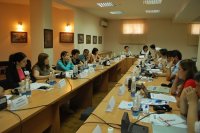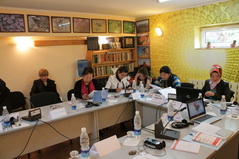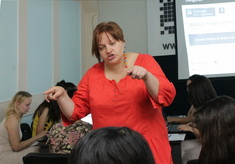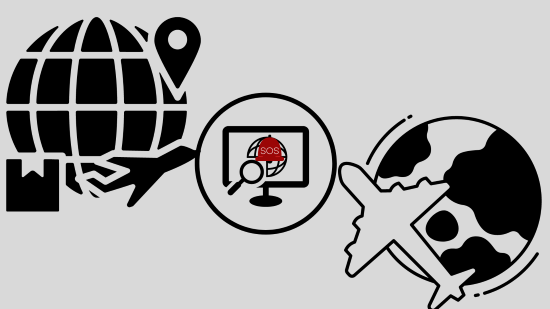 The participants agreed the idea of diversity and multilinguism
should be supported and widely promoted to make representatives of all ethnic
groups living in Kyrgyzstan feel themselves comfortable and equal. However, media
attempts are not sufficient. A package of measures is required at the level of
state policy.
The participants agreed the idea of diversity and multilinguism
should be supported and widely promoted to make representatives of all ethnic
groups living in Kyrgyzstan feel themselves comfortable and equal. However, media
attempts are not sufficient. A package of measures is required at the level of
state policy.
 According to the recent media monitoring report "Cyberhate as a trend of modern media wars”,
were demonstrated at the Almaty Forum (Kazakhstan) on April 29-30.
According to the recent media monitoring report "Cyberhate as a trend of modern media wars”,
were demonstrated at the Almaty Forum (Kazakhstan) on April 29-30.
According to the School’s analytical group assessment, the number of hostile attacks has increased on the network almost by one fourth. The research of Kyrgyzstan online media has shown that 56% of articles and posts monitored contain hostile comments and provocative calls.
"Until now, media monitoring for hate speech on the web have been perceived in terms of ethnic stereotypes, xenophobia and racism,” Inga Sikorskaya, Director of School of Peacemaking and Media Technologies, said during the presentation. "Now cyber attacks are the major part of hate speech content against various groups expressed in diverse forms.”
 Study on media in such Kyrgyzstan regions as Chui, Osh, Jalal-Abad, Batken and Bishkek was aimed at better understanding if and how local print, online and social media is portraying ethnic groups and whether the media outlets are contributing to xenophobic stereotypes and discriminatory discourse.
Study on media in such Kyrgyzstan regions as Chui, Osh, Jalal-Abad, Batken and Bishkek was aimed at better understanding if and how local print, online and social media is portraying ethnic groups and whether the media outlets are contributing to xenophobic stereotypes and discriminatory discourse.
 School of Peacemaking Journalism and Media Technology presented an annual report "Hate Speech in the Media and Internet in Kyrgyzstan-2013” Full version of the report in Russian and English is posted on the website:
School of Peacemaking Journalism and Media Technology presented an annual report "Hate Speech in the Media and Internet in Kyrgyzstan-2013” Full version of the report in Russian and English is posted on the website:
The study was undertaken by a media monitoring group in March to April and October to November 2013.
The report was based on the analysis of hate content carried in the surveyed newspapers published in Osh, Jalal-Abad and Batken regions and some print media distributed in Bishkek and Chui region, online media and posts in social networks.All surveyed media were examined for ethnic stereotypes and xenophobia.
Current content analysis showed the relevance and timeliness of the survey, and found a range of factors pointing at impending conflict in the Kyrgyz society.
A new Hate Speech report finds a range of factors pointing at impending conflict in the Kyrgyz society. The report gives trends, comparative analysis and dynamics, subjects and victims of hate speech, examples of most widespread clichés and stereotypes.
In spite of that in 2013, radical type of hate speech was used less frequently in articles, the level of hate towards ethnic groups in the media remains quite high with some change in the types of ad hominem attacks and use of covert hate.
 On October 24-25-26-27, 2013 a training on peacemaking journalism, conflict reporting and the destruction of stereotypes for print and online media in Osh, Jalalabad and Batken oblasts of Kyrgyzstan was organized by the School of Peacemaking and Media Technology of Network of Social Mediators public foundation.
On October 24-25-26-27, 2013 a training on peacemaking journalism, conflict reporting and the destruction of stereotypes for print and online media in Osh, Jalalabad and Batken oblasts of Kyrgyzstan was organized by the School of Peacemaking and Media Technology of Network of Social Mediators public foundation.
The aim of the event was to teach reporters to media tools for reducing the charge to a confrontational society, techniques destabilizing confrontation, the organization of post-conflict rehabilitation of journalists, and ways to find common mechanisms to improve the efficiency of media peacemaking efforts.
The training was held in the form of an interactive discussion. Reporters learned the theory of reporting on conflicts and consolidated their knowledge by participating in an interactive game, prepared by experienced trainers Arif Aliyev (Azerbaijan) and Ashot Melikyan (Armenia).
Training participants also used their knowledge for practical exercises to overcome xenophobic stereotypes, working with publications of local journalists containing hate speech.
With the help of the trainers journalists have developed a glossary of stereotypes, which must become a handbook for journalists working in conflict zones.
"I acquired a lot of useful knowledge in the training. Now I know how to cover conflicts correctly," a training member Apihazan Amitova, correspondent of the Osh Shamy newspaper said.
There are a lot of problems mecessary to report on in our region, however, it is dangerous to cover these problems in media. The training has taught us to conflict reporting technologies and post-conflict rehabilitation of the journalist, Alina Sydykova, correspondent of Oshmedia site said.
Today, the School of Peacemaking and Media Technologies has been trained about 80 journalists from media outlets in southern Kyrgyzstan. The training was conducted by specially developed techniques, which are based on practical experience of building media dialogue in conflict-prone areas of the world: the Balkans and the Caucasus. Within the School webinars on destroying stereotypes, clichés, and overcoming the image of the enemy in mass media are conducted.
The training is organized to promote peacemaking journalism, the ability of journalists to discuss openly issues of conflict, training of finding the common ground between the opposite sides of the conflict, and techniques of finding active groups from different communities who are ready for dialogue, analysis of existing patterns of conflicts and methods of their destruction.
The four-day training seminar for journalists in southern Kyrgyzstan is led by an experienced team of media experts with extensive practical experience in building a media dialogue in conflict areas of the world: in the Balkans and the southern Caucasus.
The event will be held in the form of interactive discussion, the combination of theory and practice.
The training will be held in Bishkek, date on October 24, 25, 26, 27 (arrival on October 23, exit on October 28) 2013. All expenses are paid by the organizers.
To participate in the seminar, it is necessary to fill out an electronic form on the site www.ca-mediators.net or to send your resume and motivational letter by October 10, 2013. In motivational letter you should indicate why you would like to participate in this training, and how it will affect the future of your career. Also, e-mail to thepeacemakingschool@gmail.com a scanned copy of your passport.
The bids are considered only if there is a complete set.
 Leading trainer in multimedia report production at the Camp for Media Innovations Oksana Silantieva recommends the following: first of all, it is important to start mastering skills of photo and video shooting using simple equipment, creating infographics on available free websites and combine everything together. Multimedia journalist is a balance between the meaning and the form, she says.
Leading trainer in multimedia report production at the Camp for Media Innovations Oksana Silantieva recommends the following: first of all, it is important to start mastering skills of photo and video shooting using simple equipment, creating infographics on available free websites and combine everything together. Multimedia journalist is a balance between the meaning and the form, she says.
Multimedia journalism is a craft. As any other craft, this profession is based on basic principles and skills. Multimedia journalist can write decently, shoot decently, make photos and create infographics decently.
If you wrote only in newspapers earlier, then you will have to learn how to make photos, study what composition and color are at a basic level, rather than at the professional photographer’s level. This is needed to make photos with correct composition, and that are meaningful. Such basic things are offered by distance courses. Now a lot of manuals can be found on the internet – go for it! Further on you will have to practice only.
As soon as you master photography, you can start video shooting. What is the difference between the photo and the video, what is editing, what views can be or cannot be edited? Just find the Principles of video editing on the internet, read them, and start shooting video. There’s no need to have classical big cameras.
Don’t try to master some extra professional equipment under any circumstance! Leave it to broadcasters. A smartphone is enough to take a nice shot that can be posted on the web. A multimedia journalist is known not for techniques (though, he can have them), but for the skill of combining them.
A multimedia journalist is a reporter obsessed with the stories. When he sees the issue, he sees what event it can be. He looks at the event and starts gathering information just like any traditional journalist does. But he structures the story in the multimedia format in his head, “So many people have gathered here! I can make a 360 degree panoramic shot to demonstrate the event vividly.”
Or, for example, the event is full of movement. People are running, bicyclers are cycling, something is falling down, someone is shouting. This movement is better demonstrated by a video. A multimedia journalist reacts promptly to that: he takes out his smartphone and records a video, collects people’s quotes, runs to the office (or uses his notebook on the spot), assembles the story out of small parts, adds some text, some photos, some infographics. Present technology helps people not master highly professional applications, but mastering figures and meaning is a must.
When you take a course in a multimedia journalism, you should not forget about traditional journalism, which implies the search and check of information, search for heroes, their development by asking correct questions, comparison of figures and data check. No technology can replace this.
To become a multimedia journalist, one should practice a lot. No university or lecture can replace daily hours-long practice. Only practice can lead to the craft of multimedia journalism. Don’t be afraid to make mistakes, to make it better and to get satisfaction from it!

Состоялась онлайн конференция, на которой обсуждались риски транснациональных репрессий в работе активистов, медиаработников, юристов и…
Можете ли вы ответить на вопрос: что такое миротворческая журналистика или журналистика мира, как это принято говорить в международной практике?
Это – позитивная журналистика?
Это – смягчение конфликта за счет историй, где говорится о том, как власти решают проблему?
Или это – баланс фактов и мнений, построенных на беспристрастной хронологии освещаемого вами конфликта?
Ни один из трех предложенных вопросов не является миротворческой журналистикой, поскольку она строится на других принципах.
Смотрите видеоурок от Инги Сикорской, директора Школы миротворчества и медиатехнологий в ЦА, медиаэксперта, исследователя, журналистки.
Инга освещала разные конфликтные события, работала в Афганистане, написала ряд учебных пособий для журналистов и активистов, в том числе "Как женщине-журналисту делать визуальные репортажи из Афганистана",
"Как освещать многообразие и этнические конфликты,"Как журналистам избегать языка вражды в своих репортажах" и другие.
Инга проводит семинары по медиа, кризисным и миротворческим коммуникациям в Центральной Азии и других странах.
Смотрите видео-урок с примерами и пояснениями, а потом выполните упражнение.
![]() Группа независимого мониторинга,
экспертизы, анализа и образования Школы миротворчества и медиатехнологий в ЦА
оказывает услуги в НКО секторе, проводит консультации, экспертизу тренинги по
вопросам, связанным с медиасферой и публичным дискурсом.
Группа независимого мониторинга,
экспертизы, анализа и образования Школы миротворчества и медиатехнологий в ЦА
оказывает услуги в НКО секторе, проводит консультации, экспертизу тренинги по
вопросам, связанным с медиасферой и публичным дискурсом.
Мы проводим медиа-мониторинги, медиа-исследования, разрабатываем медиа-планы и стратегии, готовим медиа-аналитику по заданным тематикам, а также предлагаем следующие услуги:
·исследование медиа-сферы на основе мониторинга СМИ на предмет освещения по заданной тематике с использованием уникальной методики, анализ, выработка рекомендаций;
·полный медиа-мониторинг и анализ выделенных публикаций по различным индикаторам, в зависимости от задачи– сбор всех материалов об объекте мониторинга по максимально широкому списку с помощью специальных электронных систем мониторинга, ручного поиска и интеллектуальных инструментов для анализа (кыргызский, русский, английский языки);
·по ограниченному медиа-списку – поиск публикаций об объекте мониторинга по определенному списку СМИ (обычно наиболее авторитетные, популярные, значимые с точки зрения достижения ЦА, издания);
·аналитические обзоры по заданной тематике;
·разработка моделей информационно-просветительских кампаний( интеллектуальная логистика, исследование и анализ ситуации, планирование мероприятий, определение аудитории, стратегия, сбор информации, анализ, разработка послания, определение ожидаемых результатов, тестирование кампании, разработка публичных мероприятий, отслеживание результатов кампании);
·разработка медиа-планов, мониторинг и анализ медиа-активности, кризисный медиа-мониторинг, архивный/ретроспективный медиа-мониторинг;
·консультации по созданию медиа-кампаний;
·тренинговые/обучающие услуги, мастер-классы: разработка тематики и программы тренинга;
·проведение медиа-тренингов/мастер-классов;
·информационные услуги (создание релизов, адаптация пресс-релизов под веб-публикацию. линкование, ссылки, теги и т д);
·разработка сценария и создание видео- и аудио-интервью, тезисы;
·подготовка спикеров для пресс-конференций, разработка сценария пресс-конференции и брифингов, тезисы их выступления;
·разработка медиа-плана для участия, выступающего в тематических программах по социально-значимым вопросам;
·редактирование и обработка текстов (кыргызский, русский, английский языки).
Вышеперечисленные услуги осуществляются по договору оказания платных услуг в некоммерческом секторе и рассчитаны в соответствии с калькуляцией платных услуг на текущий год. За подробной информацией обращаться на peacemakingschool@gmail.com или написать сообщение на Фейсбук https://www.facebook.com/Alinapeacemaker